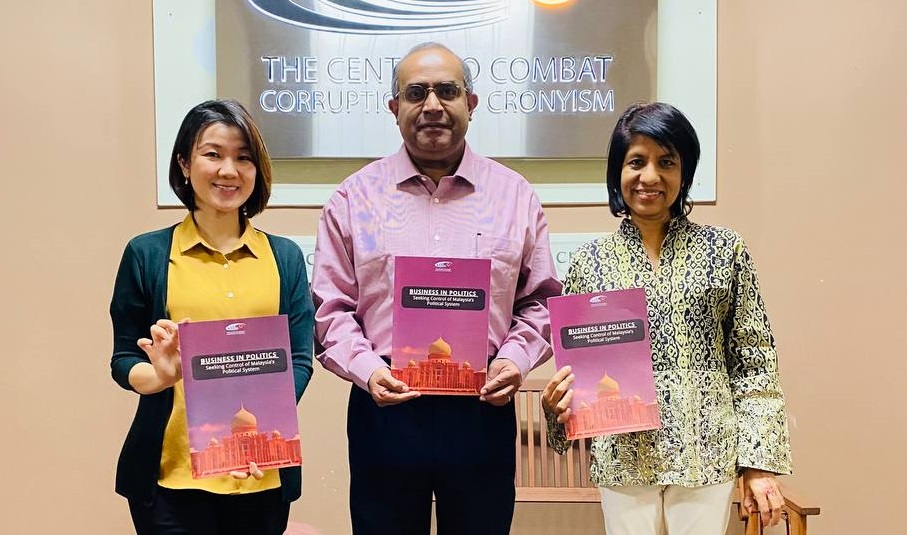
PETALING JAYA, Nov 3 – A dysfunctional political system, with abrupt changes in leadership, blatant party-hopping, to increased rent-seeking are the symptoms of a political system that has become weaker in its governing duties over the years in Malaysia.
Instead, the government has become a fertile ground for mixing business with politics that has enabled massive corruption and the facilitation of the abuse of power in various aspects of governance by some politicians who have wormed their way to the top of the system, enriching themselves and their families and perpetuating the powers of money politics along the way.
The upcoming 15th General Election can be one way to stop this dangerous mix of politics and business, beginning with the nomination of candidates. Those facing court cases on corruption charges, for one, should not be in the running till their names are cleared.
Speaking at the launch of the “Business In Politics – Seeking Control of Malaysia’s Political System” report by The Center To Combat Corruptions and Cronyism here on Wednesday, Chairman of C4 Center Dr. Edmund Terence Gomez, raised various concerns on how the Malaysian political system is being funded and how the government’s huge Government Linked Companies’ ecosystem is being abused.
He spoke of Members of Parliament and election candidates who are businesspeople and the implications of their diverse forms of business-in-politics that “function as a political strategy to obtain access to government.”
Running through the report with the media, Terence highlighted the various forms of connections between politics and business – termed business-in-politics – that of politicians who belong to a family business or are closely related to owners of such firms, MPs who are children of former leaders who were active in business, business people entering politics and former executives from the private sector and Government Linked Companies in politics and the potential dangers they pose to the future of the country, if not properly tracked.
The report also listed out huge family firms with complex mix of politicians, business people and bureaucrats, as well as children of former state rulers in this category of business-in-politics trend with the state of Sarawak and several MPs providing one glaring example.
Powerful politicians as directors in private firms, the rewarding of directorships in GLCs to politicians and the entrance of wealthy professionals and the possibility of them funding electoral campaigns were among other key findings of the report.
“This business-in-politics trend is a central factor in power struggles. Businesspeople people in politics function differently. Different actors, differently positioned in politics and business, collide, or collude with each other, leading to new elite networks and emerging politics power blocs.”
To a question on why and if businesses cannot be linked to politics, Terence pointed out that that was not the case but rather the increasingly blurring of lines between business and politics that have opened doors to power abuse, corruption and an economy favouring the elites.
The expansion of the business-political nexus has major implications, with an increasing number of businesspeople in politics and politicians in business, and there needs to be clear blocks to prevent the mixing that has been going on without many boundaries.
“How will politicians-cum-businesspeople vote in Parliament matters that do not serve their business interests? Will they shape budgets to favour their companies? How will they vote on environmental policies if they an interest in infrastructure and in plantations? How will they approach welfare systems, featuring social benefits for employees and the minimum wage?”
With access to the government, the interests of these businesspeople can be embodied in policies, they are privy to information that can enhance their corporate interests, and they have easier access to lucrative concessions.
Asset declaration, a political financing act that will regulate how parties and politicians receive and use money by ensuring disclosure the source of funds and donations have long been the preventive measures advocated, said Executive Director of C4 Center, Cynthia Gabriel.
“We came close to getting the political financing act but the Parliament was dissolved for election,” she said.
With money in politics a growing concern, party leaders in the upcoming election should look at nominating candidates who have an unblemished corruption record, she reiterated.
To a question on what if the party leaders themselves are facing corruption charges and remain in position to select the candidates, Terence responded that the party members would then have to consider.
A total of 13 MPs, who have been mired in controversial corporate-related matters, have off-shore accounts, and foreign business interests, or have hopped out of the party of coalition under whose ticket they won a seat in Parliament were reviewed in the report.
The report has also provided the mapping of family and corporate ties of MPs from Sarawak, namely Larry Sng, Fadillah Yusof, and Robert Lawson.
Also in the report are names of the children of former ruling politicians in business and now in politics, and their business activities, namely Hanifa Taib, daughter of former Chief Minister of Sarawak Taib Mahmud, Yamani Hafez Musa, son of former Chief Minister of Sabah Musa Aman, and Mukhriz Mahathir, son of former Prime Minister Tun Mahathir Mohamad.
Politicians involved in party hopping, between parties and between coalitions, while suggesting a search for access to power, have contributed to the fall of the federal and state governments, seriously undermining the electoral process and creating a highly dysfunctional political system, the report said.
Lead Researcher Sherilyn Pang said all the information in the report were sourced through the Companies Commission of Malaysia as well as other open source of information.
The full report of “Business in Politics: Seeking Control of Malaysia’s Political System” can be found at the C4 Center website: https://c4center.org/
— WE